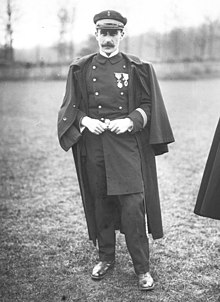Georges Hébert
Georges Hébert (27 April 1875 – 2 August 1957) was a pioneering French physical educator, theorist and instructor.
Hébert was born in Paris. While an officer in the French Navy prior to the First World War, Hébert was stationed in the town of St. Pierre, on the island of Martinique in the Caribbean Sea. In 1902 the town fell victim to a catastrophic volcanic eruption.
Hebert coordinated the escape and rescue of some seven hundred people from this disaster. This experience had a profound effect on him, and reinforced his belief that athletic skill must be combined with courage and altruism. He eventually developed this ethos into his personal motto, "Être fort pour être utile" ("Being strong to be useful").
Hébert had travelled extensively throughout the world and was impressed by the physical development and movement skills of indigenous peoples in Africa and elsewhere:
Their bodies were splendid, flexible, nimble, skillful, enduring, resistant and yet they had no other tutor in gymnastics but their lives in nature.
Upon his return to France, Hébert became a physical instructor for the French marines in Lorient, where he began to define the principles of his own system of physical education and to create apparatus and exercises to teach his "Natural Method".
Contrary to the widespread belief that his approach was exclusively based on his observations of the natural movements of indigenous people, his method is a synthesis of various influences, including but not limited to:
Hebert's system rejected remedial gymnastics and of the popular Swedish Method of physical culture, which seemed to him unable to develop the human body harmoniously and especially unable to prepare his students with the practical and moral demands of life.
In the same way, Hébert believed, by concentrating on competition and performance, competitive sport diverted physical education both from its physiological ends and its ability to foster sound moral values.
For Georges Hébert, influenced by the teachings of philosopher and educationalist Jean-Jacques Rousseau, only the observation of nature could lead people to the true methods of physical development. He wrote:
...
Wikipedia

